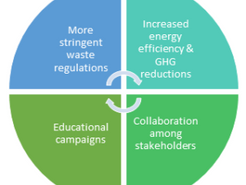

Using worms and fungi to compost packaging
Oyster mushroom fragment in hydrated packaging material. Compostable food packaging – those beige colored forks and spoons, or clamshells...
Sep 24, 2020


Plant Chicago Annual Report 2019
Learn how Plant Chicago plans to move forward in their new space at the firehouse, including our specific programs (small business,...
Apr 29, 2020


Circular Economy Leaders Network Meeting Review
This past week, Plant Chicago welcomed sixteen local small businesses to their first Circular Economy (CE) Leaders Network meeting. First...
Feb 14, 2020


Scoby Textiles part 2
If you’ve been following our social media, you’ve seen periodic updates of Eva’s SCOBY textile project. Below is her summary, the final...
May 29, 2019


A first look at SCOBY textiles
Introducing Plant Chicago’s newest intern, Eva Durance, who is experimenting with SCOBYs as a means of textile production. For this...
Mar 9, 2019


Imperfect Produce April 2019 Collaboration
For the month of April, you can support Plant Chicago using Imperfect Produce’s service! Imperfect Produce and Plant Chicago have shared...
Feb 21, 2019


Local Circular Economy Principles
With our focus on local, Plant Chicago thinks about circular economies from a unique angle. In 2017, Plant Chicago hosted a portion of...
Dec 19, 2018


Plant Chicago endorses the New Plastics Economy Global Commitment
Plant Chicago has joined voices with over 250 companies, governments, and non-profits to endorse the New Plastics Economy Global...
Oct 30, 2018


Small businesses and the circular economy
Plant Chicago is located across the street from a McDonald’s, a former Wal-Mart, and several small restaurants. Wal-Mart has been making...
Oct 30, 2018


Human Versus Machine: Home Appliances
Post by John Mulrow, PhD Candidate in Civil Engineering at University of Illinois Chicago INTRODUCTION In the last Human v Machine blog...
Aug 14, 2018


What I Learned from Standing Next to a Trash Bin
By Dana Greene, Materials Management Intern As an intern with Plant Chicago, I have been able to work on a variety of unique projects...
Jul 5, 2018


Human Versus Machine: Compost Screening
Post by John Mulrow, PhD Candidate at University of Illinois Chicago INTRODUCTION Composting is a simple and traditional circular economy...
Jul 3, 2018


Plant Chicago Summer Interns
Help us welcome our new Plant Chicago summer interns! We are excited to have such a diverse group of college and high school students...
Jul 3, 2018


Would you wear a mushroom shirt?
This spring/summer Plant Chicago is hosting artist and mycologist Xiili Bassett, assisting in her newest project titled hyphaenate....
Apr 14, 2018


Decision making for the Circular Economy: Life Cycle Assessment
Post by Shauhrat Chopra (Assistant Professor, City University of Hong Kong, formerly a Post-Doctoral Researcher at University of Illinois...
Feb 12, 2018


Thinking Circular, with Chemistry
Post by John Mulrow, Civil Engineering PhD Candidate at University of Illinois at Chicago. This post describes a chemistry...
Jan 17, 2018


Measuring Food, Energy and Water Flows at The Plant
Article by Eva Chancé, French National Institute for Agricultural Research (INRA) (This research was led by Eva in partnership with Plant...
Oct 26, 2017


How to Transition Chicago to a Circular Economy
Article by Jaycie Weathers and Dr. Nancy E. Landrum, at Loyola University Chicago, summarizing circular economy research, conducted in...
Aug 23, 2017



